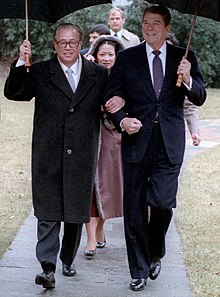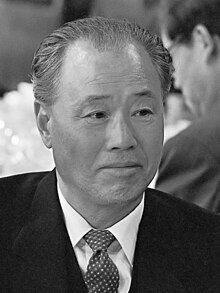Zhao Ziyang

Zhào Zǐyáng ( Chinese 趙紫陽 / 赵紫阳 ; * October 17, 1919 ; † January 17, 2005 in Beijing ) was a politician of the People's Republic of China . He was Prime Minister of the People's Republic of China from 1980 to 1987 and General Secretary of the Communist Party of China from 1987 to 1989. Since 1986 he has been responsible for China's political reforms .
life and career
Zhao was born the son of a wealthy landowner in Henan Province . In 1932 he joined the Communist Youth Association and worked underground for the Communist Party during the Sino-Japanese War . In the 1950s he served in the leadership of the party in Guangdong Province , and in the 1960s he was promoted to party secretary in that province.
Since he supported the reforms of Liu Shaoqi , he was replaced as party leader during the Cultural Revolution . He was forced to march through the streets of Guangzhou city wearing a penitent cap and was ordered to work in Inner Mongolia in 1971 .
In 1973 he was rehabilitated by then Prime Minister Zhou Enlai and sent to the largest province of China, Sichuan . There he was the first party secretary from 1975 and introduced market-oriented reforms in the country, which led to a rapid increase in production. Therefore there was a proverb in Sichuan at that time yào chī mǐ, zhǎo Wàn Lǐ; yào chī liáng, zhǎo Zǐyáng ( 要吃 米 , 找 萬里 ; 要 吃糧 , 找 紫陽. ), which is a play on words with the name “Zhao Ziyang” and translates as “If you want to eat rice, look for Wan Li ; if you want to eat grain, search Zhao Ziyang ”means ( Zhào is the surname of Zhao Ziyang; zhǎo means“ search ”or“ find ”). At the same time, Zhao was a member of the Communist Party committee. From 1977 he was a member of the Politburo , a few years later he became Deputy Prime Minister.
After serving as deputy prime minister for half a year , he was appointed prime minister in 1980. In January 1987, he moved to the post of General Secretary of the Chinese Communist Party, and was succeeded by Li Peng as Prime Minister .
As Secretary General, Zhao stood for an open foreign policy and for the implementation of economic reforms. Zhao called political reforms the "greatest test for socialism". He was of the opinion that economic progress can only be successful in harmony with democratization. As early as 1986 he was the first high-ranking leader of the Communist Party to call for political change, he introduced a system of several candidates for the election of village representatives and wanted to extend this concept to the level of the Central Committee . His economic reforms were just as progressive for his time. He developed the "Theory of Temporary Phases" in which he paved the way for the reform of the socialist system, the implementation of which made possible the economic upswing in which China is still today. However, Zhao was also criticized for economic reforms because they triggered inflation .
In the 1980s he was criticized as a revisionist of Marxism . He tried to make the government more transparent and promoted a political dialogue that involved the ordinary citizen in the political processes. This made him popular among the population.
Tian'anmen events and disempowerment
During the events surrounding the Tian'anmen massacre in 1989, Zhao spoke to the protesting students to persuade them to stop their protests before it was too late. At the same time, the other Communist Party leaders - Deng Xiaoping , Yang Shangkun , Li Peng and Hu Qili - were preparing to declare martial law to quell the protests. What motivated Zhao to take up his stance on the protests is still discussed today. Some said that he hoped a conciliatory gesture towards the protesters would give him more weight in the fight against the hardliners within the party. Zhao Ziyang was the most senior CCP official who spoke out against the violent crackdown on the protests.
After the crackdown on the protests, a struggle for power broke out in which Zhao was forced to give up all his posts and was placed under house arrest for the rest of his life because of his sympathy for the protesting students.
The death of Zhao Ziyang in January 2005 raised fears of new unrest among the government. In the history of the People's Republic, mourning rallies for deceased popular politicians had repeatedly led to demonstrations, such as the death of Hu Yaobang in 1989 to the student protests on Tian'anmen Square , which was followed or even before the Tian'anmen massacre in the Tian'anmen incident after Zhou Enlai's death in 1976. That is why the government put the party on alert back in April after Zhao suffered a lung attack.
There is suspicion that research into Zhao Ziyang led to the arrest of regime critic Ching Cheong .
In 2009, Prisoner of State was published. The book is based on 30 audio cassettes that Zhao recorded at home between 1999 and 2000. In it he settles accounts with Li Peng, Li Xiannian , Yao Yilin , Deng Liqun, Hu Qiaomu and Wang Zhen . The disaster at the time was avoidable, he writes.
After his death, Zhao's remains were cremated. The Chinese authorities initially did not allow the family to be buried, which is why they took the urn with his ashes home with them. It was not until October 18, 2019, that the ashes of Zhao and his wife were buried in a small ceremony to which only the closest family members and friends were allowed at the Tianshou Garden Cemetery in Changping , a northern district of Beijing. Zhao's memory has been largely erased from the history books and official historiography by the official Chinese Communist Party, as has most other Tian'anmen-related events. Every year since his death, numerous sympathizers of Zhao have gathered in his study and in the courtyard in front of it to commemorate him. Access to this place is strictly regulated by the Chinese security forces and visitors are registered with surveillance cameras.
Publications
- Report of the CPC Central Committee to the 13th Congress. In: 13th Congress of the Communist Party of China. Dietz-Verlag, Berlin 1988, ISBN 3-320-01227-4 .
Web links
Individual evidence
- ^ A b Kathy Long: Zhao Ziyang: A reformer China's Communist Party wants to forget. BBC News, January 18, 2019, accessed January 18, 2019 .
- ↑ Annette Langer : China's dissidents: Into prison, out of prison . ( Memento of February 7, 2008 in the Internet Archive ) Spiegel Online , February 5, 2008.
- ↑ Perry Link: The Tiananmen Diaries . Washington Post , May 17, 2009.
- ↑ Justus Krüger: The dead Zhao shocks his comrades: there are memoirs of China's former Communist Party leader . In: Berliner Zeitung , May 16, 2009.
- ↑ Zhao Ziyang: Purged Chinese Communist reformers is buried. BBC News, October 18, 2019, accessed February 12, 2020 .
- ^ Former Top Communist Party Aide Visits Grave of Late Ousted Chinese Premier. Radio Free Asia, October 25, 2019, accessed February 12, 2020 .
| predecessor | Office | successor |
|---|---|---|
| Hua Guofeng |
Prime Minister of the People's Republic of China 1980–1987 |
Li Peng |
| personal data | |
|---|---|
| SURNAME | Zhao Ziyang |
| ALTERNATIVE NAMES | Zhào, Zǐyáng |
| BRIEF DESCRIPTION | Chinese politician of the People's Republic of China |
| DATE OF BIRTH | October 17, 1919 |
| DATE OF DEATH | January 17, 2005 |
| Place of death | Beijing |


